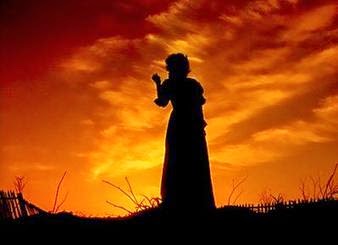Director: John Ford
Starring: Walter Pidgeon, Maureen O’Hara
Other Oscar Wins: Best Actor in a Supporting Role (Donald
Crisp), Best Director, Best Cinematography, Best Art Direction
Other Oscar Nominations: Best Actress in a Supporting Role (Sara
Allgood), Best Writing, Best Sound, Best Film Editing, Best Score
Favourite Line: "Prayer is only another name for good, clean, direct thinking. When you pray, think. Think well what you're saying. Make your thoughts into things that are solid. In that way, your prayer will have strength, and that strength will become a part of you, body, mind, and spirit."
 |
| A scene from How Green Was My Valley. |
This movie is brilliantly filmed and written with some lovely performances from all involved. The most impressive, I found, was Donald Crisp as Huw's father, Mr. Morgan. He certainly earned his Oscar, and his performance is very truthful and nuanced. Also, Roddy McDowall as Huw himself is so endearing and he draws the viewer into the story.
 |
| Art by Olly Moss. |
Perhaps How Green Was My Valley's biggest claim to fame is that it beat Orson Welles masterpiece, Citizen Kane, for Best Picture. Citizen Kane is widely considered one of, if not the best film ever made, whereas How Green My Valley has faded into obscurity. Nonetheless, this is a lovely film, which I would recommend viewing, even just once.







